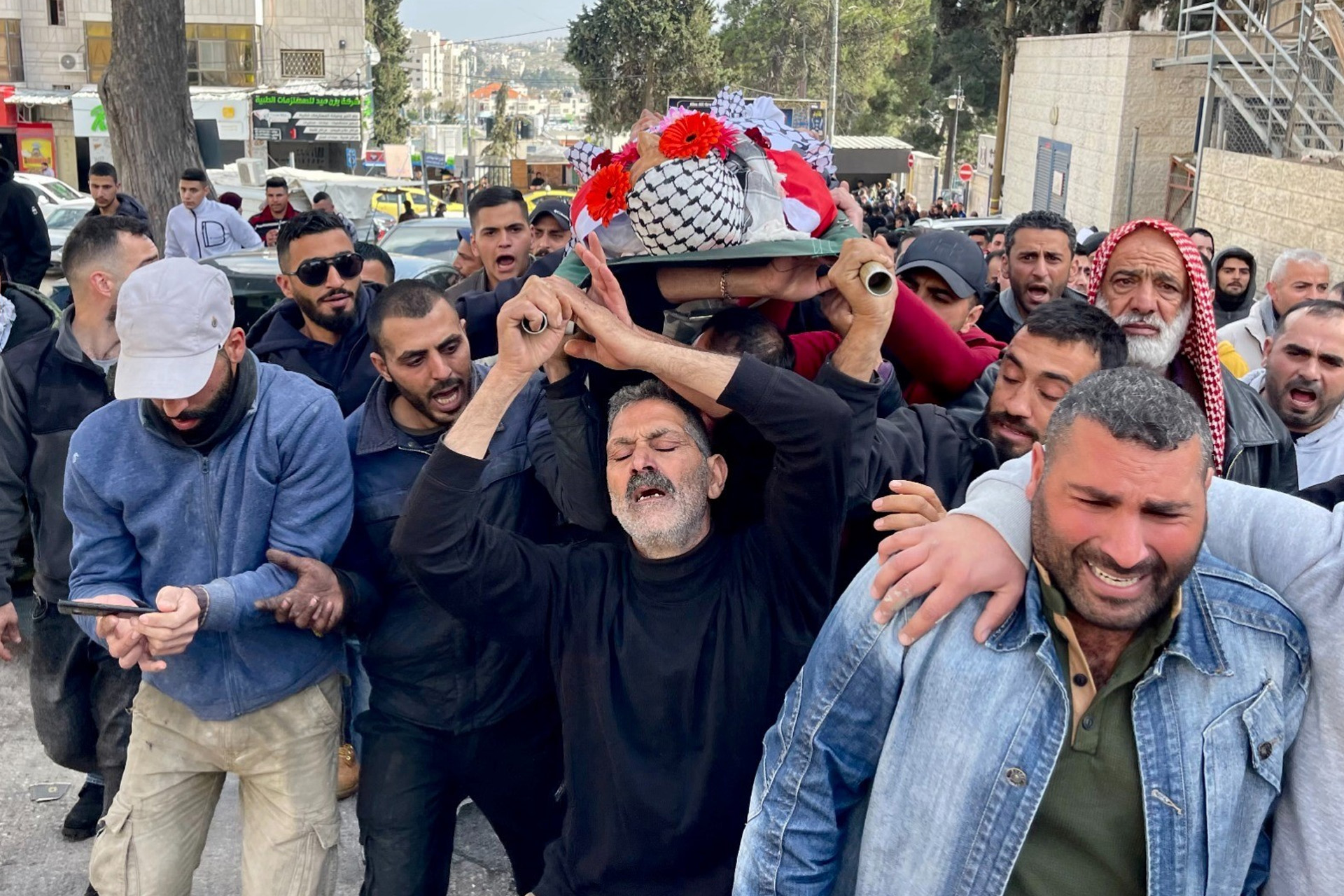The people of Ramallah mourned the funeral of the martyr Ahmed Kahla, who was killed by the Israeli occupation army this Sunday morning, and while Palestinian factions condemned the policy of "field executions" carried out by the occupation against Palestinians in the occupied West Bank, China called on Israel to stop provoking the Palestinians.
The martyr Kahla died of injuries he sustained by the occupation forces this morning near the town of Silwad, east of Ramallah.
The funeral procession of Ahmed Abdel-Jalil Kahla (45 years) departed from the Palestine Medical Complex in Ramallah to his hometown of Ramon, northeast of the city, where his body was buried.
Farewell to the body of the citizen Ahmed Kahla, who rose in the morning near Silwad pic.twitter.com/JwUJj02Dqh
- Palestine Now (@paltimes2015) January 15, 2023
Hebrew sources stated that an Israeli force shot the man under the pretext that he was trying to carry out a stabbing attack.
On the other hand, Palestinian eyewitnesses denied any stabbing and confirmed that the occupation soldiers shot the young man after a verbal altercation.
Palestinians posted on social media a recorded video documenting the moment the martyr Ahmed Kahla was shot.
The video reveals that the occupation soldiers beat the man while he was trying to defend himself, and then fired live fire and killed him.
With Kahla's death, the number of Palestinians killed by the Israeli army since the beginning of 2023 has risen to 13, including 3 martyrs in Jenin yesterday, Saturday, according to the Palestinian Ministry of Health.
The Palestinian Prime Minister, Muhammad Shtayyeh, held the occupation authorities fully responsible for the ongoing crimes.
In a statement, Shtayyeh called on the United Nations to provide international protection for the Palestinian people.
In a statement, the Palestinian Ministry of Foreign Affairs condemned in the strongest terms the heinous crime of execution committed by the occupation forces.
It held the Israeli government fully and directly responsible for these crimes and their consequences and repercussions on the conflict arena.
A remarkable escalation
The West Bank has witnessed a remarkable escalation since the beginning of this year. The military operations launched by the occupation forces since the government of Benjamin Netanyahu came to power have resulted in the death of 13 Palestinians in the West Bank and Jerusalem, and the arrest of about 190 Palestinians, most of whom are in the West Bank.
On January 2, violent clashes erupted during the occupation forces stormed the town of Kafrdan, west of Jenin, and the operation resulted in the death of two Palestinian youths.
On the third of this month, the Israeli Minister of National Security, Itamar Ben Gvir, and a group of settlers stormed the courtyards of Al-Aqsa Mosque, under the protection of the police.
On the same day, the 15-year-old child, Adam Ayad, was killed by a bullet in the chest during the occupation forces' raid on Dheisheh refugee camp in Bethlehem.
On January 14, the occupation forces chased after a Palestinian vehicle and killed two young Palestinians, after it stormed the town of Jaba, south of Jenin.
As part of the punitive measures initiated by the Minister of National Security, Itamar Ben Gvir, against the Palestinian prisoners, the occupation transferred 40 prisoners with high sentences from Hadarim prison, north of Tel Aviv, to Nafha prison in the Negev desert in southern Israel.
condemnation of factions
In the context, the Islamic Resistance Movement "Hamas" called, in a statement, to "try the Israelis who commit assassination crimes against the Palestinians in the West Bank in international courts."
In the statement, she said that the occupation's crime today of assassinating a Palestinian in cold blood and executing him directly in front of his son, after removing him from a vehicle, is Zionist terrorism and a dangerous escalation.
For its part, the Islamic Jihad said that the scene of the execution of a Palestinian by the fire of the occupation soldiers in front of the eyes of the world is a heinous crime that proves over and over again the extent of oppression against our people.
The movement vowed to respond to the Israeli crimes, saying that "its mujahideen will not remain silent for long in front of this fascist crime and in front of the killing of 13 of our people within two weeks."
In turn, the Popular Front for the Liberation of Palestine said that the policy of "field executions" carried out by the occupation against Palestinians under flimsy pretexts will not break the will of the people.
And she stressed, in her statement, that these assassinations reflect the racism and fascism that characterizes the state of the Zionist entity.
As for the Al-Ahrar Movement, it called on the Palestinians in the West Bank to "ignite a comprehensive uprising in order to curb the rebellion and aggression of the occupation."
China's position
In Beijing, Chinese Foreign Minister Chen Gang called on Israel, Sunday, to "stop provocations" in Palestine "to avoid aggravation of the situation."
"The Palestinian issue is a fundamental issue in the Middle East, and recently we are concerned about the recent developments in Palestine," Jang added, during a joint press conference in Cairo with his Egyptian counterpart, Sameh Shoukry.
He called on the concerned parties to abide by international resolutions, preserve the historical status of Jerusalem, and exercise restraint and calmness in order to avoid further escalation of tensions, especially that Israel should stop provocations in order to avoid exacerbating the situation.
Jang also called on the international community to support the principle of a two-state solution (Palestinian and Israeli) and land for peace, activate negotiations and support the Palestinians to find a just solution to the issue.
Since April 2014, negotiations between the Palestinian and Israeli sides have stalled.
As a result of Tel Aviv's refusal to stop settlement activity and release Palestinian detainees, as well as its disavowal of the principle of the two-state solution.

